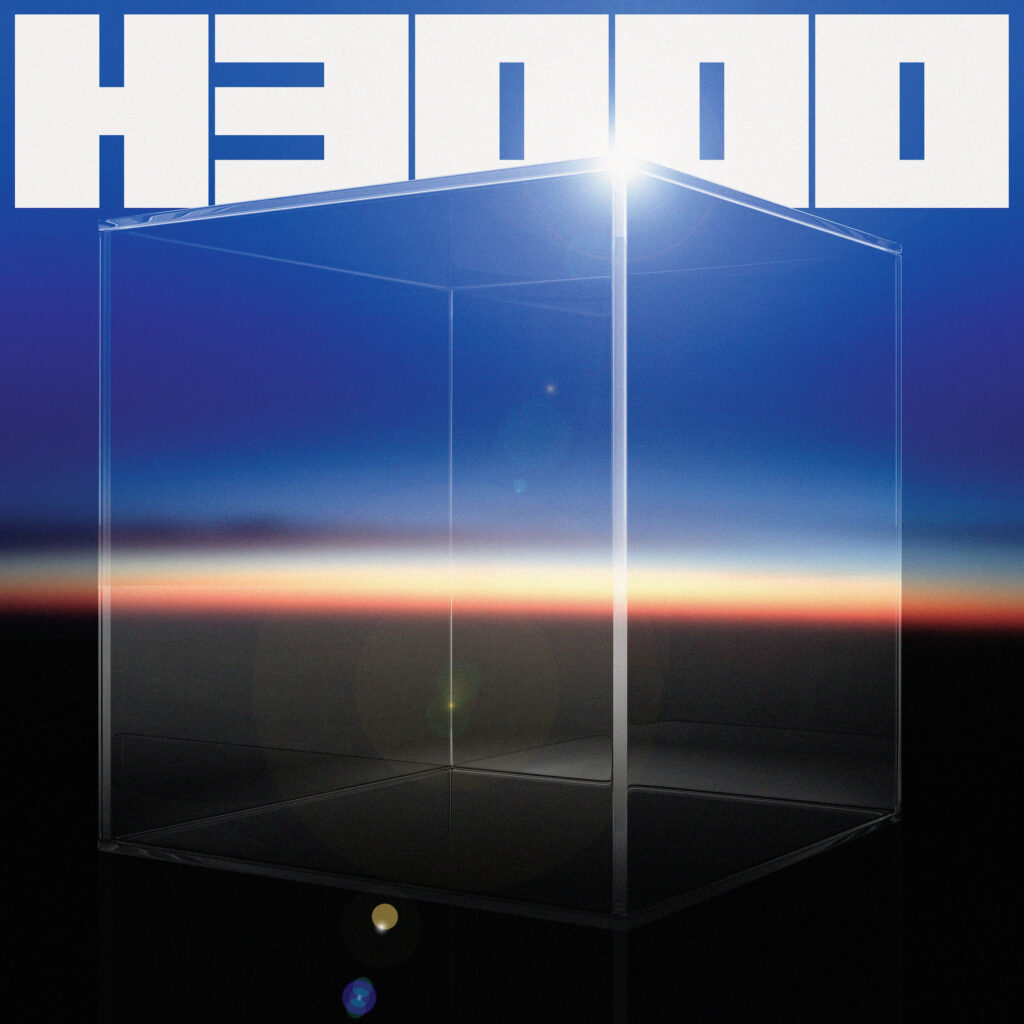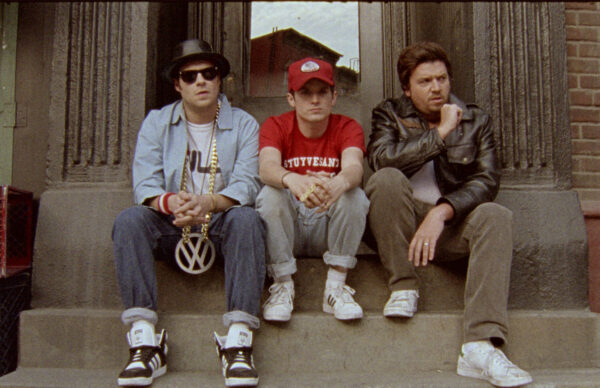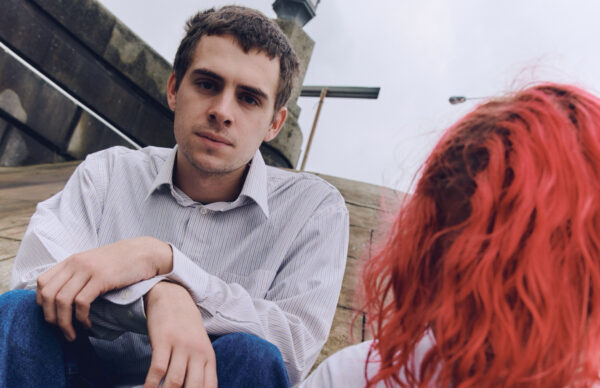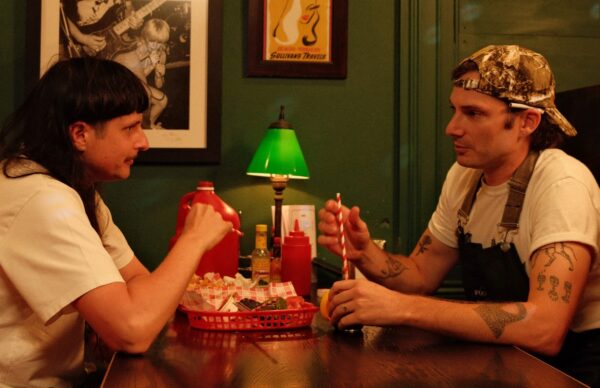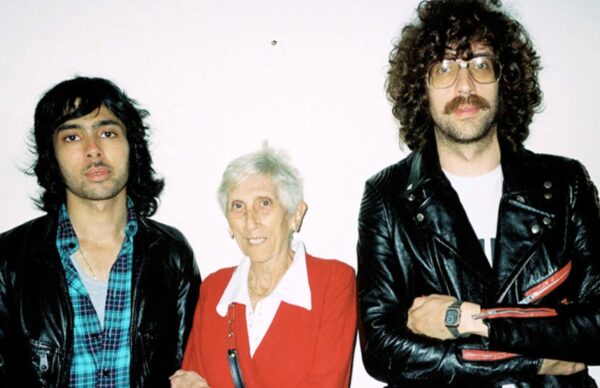Take their hand as they venture through the next century…
The year 3000. It seems like lifetimes upon lifetimes away, but in reality its less than 80 years off. Will we make it there? It sure seems unlikely given the current state of the world, but we still dare to dream and make predictions as to what life will be like on that side of the century. Intergalactic duo H3000 are leading the charge with such efforts, and their debut album (out today) is rife with enough exploration to map out the cosmos.
The debut self-titled album sees the two musical maestros throw all of their creativity and inspiration into one burning cauldron of fusion, resulting in five tracks on fire with life and being. From the high octane ‘July Heat’ to the transcendent ‘Human Heart’ to ‘Quicksand’ and Sunset Boulevard ready ‘Thought You Knew,’ the album is full of vigour of and life.
Take our hand as we dive headfirst into the album in all of its exuberance and existentialism.
Opening the album with the pitch-warbling madness of ‘July Heat,’ the two musos waste no time in letting you know this is an album of the interplanetary variety. Then of course comes singer Luke Steele’s iconic voice, singing atop a minimal beat with euphoric synths emanating in the background. He’s in no short supply in the emotions department, which is beautifully magnified around 1:30 as they explode together in the cosmos.
But despite the seemingly boundless energy the two sonic shamans are creating with, they’re just as comfortable on the other side of the spectrum, wonderfully shown in the acoustic-driven ballad ‘Flames.’ Peppered with shimming electronic ornamentation beneath Steele’s larger than life vocals, the track listens like an anthem for the planet, one all can relate to.
It’s a sentiment repeated on ‘Running,’ further driven home by some of the most personal record like ‘It’s all rushing through my head/It’s on my heart eternal flame/I was always working it out/Didn’t begin ’til I got to the end.’ Created to explore the nature of “deciphering the tongue” and “understanding the strength it has,” the two homegrown musos further affirm that despite all the glitz and glam of the EP in the sonic realm, they’ve got the lyricism to match.
And it’s all embodied on ‘Human Heart,’ the frenetic wizardry on full display as the cascading synths contrast the vivid storytelling almost as if the two creators are narrating the end of the universe. The harmonic instrumental around two minutes in is straight up heavenly as well, adding further nuance to the sonic journey you’re currently undertaking in all of its splendour and amazement.
It just goes to show that the number of decibels can’t dampen or blunt the emotional resonance of a record, the investigations of the human condition fully dived into in ‘Quicksand’ and ‘Rest’ as Steele and Rogers explore life, death, love, lust and all of the ingredients for this little thing we’re living called life. They’re both oozing with emotion, so much so it’s kind of hard to stay above the crushing waves of feeling, to tread water as they slam you with their endless existential quandaries and queries.
It’s especially true in the most quiet moments of ‘Rest,’ the Avicii-inspired ballad rippling with emotion as the two creators pay tribute to their peer and friend. It’s definitely an emotional high of the record, the celebration of life in the face of death tinged with this bittersweet ecstasy that’s both soul-destroying and life affirming. It’s all there, a rollercoaster of emotions that hits you to the bone.
Finally, the album closer ‘Thought You Knew,’ the sunset sonic that rises and shines like few others on the record. It all comes to a head here: the production, lyrics, vocals, emotion, everything. It’s a finale the types of which you deserve after a rollercoaster like this, and leaves you wondering as to what the two musical ventures have planned next.
Now, check out our chat with Luke and Jarrad from the duo below.
You describe H3000 coming together as the result of a chance encounter. How’d you guys meet?
Jarrad: We were both living in LA at the time when Luke and Daniel Johns hit up our mutual friend M-Phazes. They were working on the Dreams record and they needed some help on production. M-Phazes just asked me “Hey, do you want to come join and spend a day and just see what happens?” And I was like, “Yeah, 100%,” because it’s Luke Steele and Daniel Johns, who I’m both a massive fan of. When I got to the studio I didn’t really have a huge amount that I knew what to do with other than a few hooks and whatnot, and I just started sampling and thought, “I’ll go do something crazy and see what they reckon.” And I came out of the studio two hours later, and they loved it.
And that led me to co-producing some stuff on Dreams. And then we finished it off at Luke’s house and Luke and I slowly became better friends, and slowly started sharing beats and so on. Fast forward, after a bunch of expensive sandwiches because he was living in Brentwood at the time, here we are with H3000. Literally $30 dollar sandwiches were consumed while-
Luke: Can we not talk about the sandwiches? Every interview, bro, the sandwiches keep coming up and I think that’s-
Jarrad: We have to, bro.
You’ve got to talk about it now.
Luke: I was living in Brentwood, like a really rich neighbourhood-
Jarrad: See, bro, you’re talking about the sandwiches.
Luke: And then he’d come over, we’d have expensive sandwiches and coffee. And when you pay that much, you’ve got to make something good.
Jarrad: You’ve got to try and make the money back from the $30 sandwiches.
You both have been a part of some amazing musical projects over the years, ones that have really shaped music and culture as a whole. How have they both led up to and eventuated in H3000?
Luke: That’s a hard one because it’s just on God’s timing. It is funny with this project, because I’ve found that some influences we’ve incorporated I had when I was 15. A lot of the vocal bits remind me of ’80s films as well, like Flight of the Navigator where it’s a secret message or discovering a portal, which changes your life forever.
I’d come back from Japan with all these strange gadgets that made sounds and I was trying all these weird vocal effects. Then Jarrad would have the similar thing in his production and we’d put it together. It’s funny with inspiration because it’s like you’re a human sponge and then it happens when it happens.
Jarrad: You can hear a bunch of lessons from other projects that we’ve worked on, but as Luke said, as artists you’re constantly applying the things that you’ve learned over the years and even just five minutes ago.
Now to dig into the album, it’s so high-octane and bursting with life. It sounds like it’s made from a stream of consciousness of inspiration. Is that accurate?
Jarrad: It definitely was that. I love that you say stream of consciousness because that’s definitely what it was. We didn’t really calculate it much at all. We just kept flowing from one song to the next and it was really quick; like a spiritual connection as we say. It just happened. And we probably spent more time in different rooms than we did in the same room.
It’s too expensive. Those damn sandwiches. We’d just fly stuff across. It was pre-pandemic as well. But it was almost like a taste of what was coming in the future and we did create it like that. And we were just flying by the seat of our pants and made sure it felt exciting. I’m glad it translated that way to you.
There are so many sounds on this album. How would you both describe it?
Luke: Island pop music or something.
Jarrad: Futuristic island pop music. I think that’s part of the point. I personally love doing stuff that is hard to describe or box in. We definitely tried to blend a lot of stuff that we loved into the music. Some of it’s hyper-pop, but it was made before hyper pop was being called by that name. What do you call it, Luke? You describe it as high super high fidelity or something.
Luke: Hyper-fidelity ocean.
Jarrad: Hyper fidelity. It’s like turning everything up to 11.
‘July Heat’ is a really cool meditative cut to open the album with. I’m imagining some turbulent event happened in July just going off the name. Is there any truth to that?
Luke: After it being all heavy and profound in that last statement, it was just because it was really hot in July [laughs].
Jarrad: It was so hot, bro. I wanted it to be so deep, but it was a hot summer. It was like 44 or something when we wrote that song. And I just said ‘July Heat’ to Luke and it was literally just because it was really warm.
You’ve got this lyric that reads ‘Why am I always needing a break? When I’m meant to be free? What does that say?’ From the start you’re asking some heavy questions on this album. Did you get any answers to them throughout the making of it?
Luke: The biggest answer is that ‘God is good all of the time, and there’s going to be about 55 million things that you don’t understand, but you have to trust.’ We both went through some really big moments in our lives there and the songs were our outlet.
They were kind of prayers to some of the things that were going on. Jarrad had moved his whole family back to Australia, which was obviously a massive move. And I was dealing with all kinds of things from my kids getting caught in a lockdown to suicides from famous people that we knew. So all of that is questions that you ask, but then it all comes back to you’ve got to just trust the architect.
Jarrad: It sounds super deep, man.
Luke: It is deep. I was thinking, “Why? I’m meant to be free. I’m meant to be a spiritualist and I’m meant to be in perfect peace, but I’m always needing a break, I’m never free. It’s kind of like stopping and going, “What am I doing wrong here?”
Jarrad: But sometimes deep stuff does come out of just being like, “Oh man, it’s hot.” And then Luke will put some spin on it. But it was literally a very hot day I think that day. I remember feeling how hot it was.
Climate change is real.
Jarrad: You can definitely spin that. Put in that climate change comment. That’d be great, man. We’d appreciate that.
There definitely is a focus on lyricism on the record, especially the verse in ‘Running’ reading ‘Pressures gone from my heart/Cause I’m running with you/And you’re running with me.’ Was there a conscious effort to make the lyrics balance out with how salient the production is?
Luke: Not really. But when Jarrad would send a sketch of a track, it’d be obvious what the subject was going to be. When he sent in the backing for ‘Rest,’ it was just on the… Avicii had just died a couple of days before. And it was just heartbreaking because Jarrad worked with him, and I was about to work with him and I just wrote it.
And it was about him ascending to heaven and basically just talking to God on the way there going, “I’m sorry. I didn’t mean to kill myself.” So all the themes are about issues of the heart. It all starts in the heart. And if you don’t go into those dark rooms and clear that out, it’ll go to the next room and then it becomes a problem.
Luke your voice is so iconic and has soundtracked so many memories over the years. Was there ever a defining moment throughout it all when you realised the power it has? To tell stories?
Luke: That’s a good question. It’s funny because there have been certain moments where I’ve had people with a really strong power of influence want my voice and you just go, “Whoa.” Like when Jay Z said, “I want your voice on the first track on my record,” I was like, “Wow, okay.”
And not that it doesn’t matter when people with not as much influence want your voice, but obviously it holds a lot of weight when it’s a huge artist. But yeah, there’s been different moments like that. I think you try to have humility. Pharrell was another one that I worked with and he just loved my voice and that. Probably should stop smoking so I can protect this thing [laughs].
The video for ‘Flames’ is really psychedelic and transportive and sees you guys get your own digital avatars. Was there a desire to create your own cinematic universe with this album?
Jarrad: I think so, yeah. You always try and get the visuals to be inspired by the sound. And we just wanted to take this into another universe like we did with the sonics. Luke is so great with seeing stuff. I will be the first to say I hear stuff way more than I see it, but he can do both. And it’s just awesome to watch. And it was awesome to be involved in something that was an escape. Music is something that we use to escape, isn’t it? And in this world that we created, it’s a sick universe that we’ll continue building. It just makes it a little bit more beyond us. H3000, the year 3000.
The song titles are also quite emotive and personal, with tracks like ‘Human Heart’, ‘Thought You Knew’, and even ‘Quicksand’ symbolising deeper human emotions and such. Was there an aspect of the human condition you were trying to investigate with this album?
Luke: Everything. It’s all in there. It’s so deep the things that go on inside one person. It’s all of that. I don’t know how to put that into a sentence, but-
Jarrad: There was definitely a lot of conversation around what the heart would look like in the year 3000 and exploring that sort of thing. So from that spins a lot of other things, but as Luke said, he’s the one who drives the lyrics, but there’s definitely a lot of things in it for sure.
Luke: In ‘Quicksand’, the main line is a scripture, it’s “Comparison and envy are the thieves of joy,” and I think I struggle with that a lot when it’s an 18-year-old kid who doesn’t do anything except sit by the pool and talk about the football or something. So I think there’s definitely issues around that going on in the record, that battle between heaven and the earth.
The last two years have been really wild for everyone. How does H3000 compare to your past projects in terms of escapism and catharsis from the craziness of the world?
Luke: I really enjoyed the process, the friendship and the flow. I was talking about this the other day to someone. I’ve never been the type of person that plays beer pong or goes to scuba diving camp. So I think music for me was always my way of just hanging out and creating something dope. And I enjoyed this process a lot because we’d both work at a certain pace and just get in to get it done and make something fresh. I work at a pretty fast pace, but I realized Jarrad was probably more mental than me about how fast and frenetic he works. It made for a great record and I think that’s what was different for me. We’re in that high fidelity speed of creation, which is kind of unique.
Jarrad: Yeah. I guess we’d have to… just speaking about candidly, it may not always be that way. This time it was. Sometimes you have to dive in and labor, but this one was so quick and effortless. We were caught up in the flow that was beyond us. It sounds a bit cliché, but it actually was very true.
There are so many electric effects and so on throughout this album. As a production enthusiast, did you guys have a favourite plug-in or effect you relied on during the making of this album?
Jarrad: Dominion was always one we’d always try and get on everything.
Luke: Someone once asked me “What’s your secret weapon” and I was like, “I’m not telling you.”
Jarrad: Oh, sorry man. I just gave it away. I’ll always have Pro Tools and my OP-1 pretty close. Stuff that’s trying to be a little less calculated and capture something where no one knows how we did it. But then we get on interviews and I give away the secret sauce [laughs]. I love it when you find someone who’s excited about that stuff though because we certainly tried to get a lot of detail in the record. I love the tiniest little things that only people like yourself hear. That’s when you’re like, “It was all worth it.”
‘Thought You Knew’ is such an unexpected way to finish the album. Was that more concluding the story of the album, or giving a preview of whats to come?
Luke: I think it was neither but it’s really cool that you say that.
Jarrad: Yeah, that’s awesome. It was definitely a moment on the record, even when we created it. There’s something about that record that has always held a pretty special place. It’s one of those records, man.
Luke: I love that. I remember finishing it and then being in an Uber, going to this big party at Capitol Records. I just had it blasting and was going down Sunset Boulevard and thinking “this is a great record.”
Lastly, your album bio said to ‘join Luke and Jarrad as they take on the year 3000 together.’ Why the year 3000? And how do you see humanity, music and culture existing in that year? If we even get there?
Luke: Well, in Australia there was that show, Beyond 2000. That’s probably showing my age [laughs] But we couldn’t do beyond 2000 years and it felt like a pretty dope name. Like ‘what’s the heart and what are the heavens going to be like in year 3000?’
Jarrad: It’s funny that everyone asks us that, but they ask us in a non-excited way. It’s always like “If we ever get there.” I love that it brings up that conversation and makes us ask ourselves if we would get there and what it would be like. But who knows? At the rate we’re going, something’s got to change because we’re not going to be in a great place. And I think our conversation starter is as important as having the answers.
H3000’s debut album is out now. You can buy/stream it here. Be sure to keep up with them on Instagram to stay up to date on all of their latest projects.
